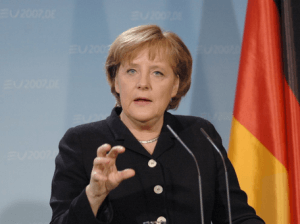Merkel delivers barnstorming speech that highlights gulf with Trump

German Chancellor Angela Merkel issued a stark warning on Saturday against abandoning international political structures, calling for treaties rejected by the US to be rescued.
“We cannot simply break them down,” she said in a wide-ranging address to the Munich Security Conference on Saturday, observing that there were “a great many conflicts that challenge us.”
The comments by Merkel, who is in the twilight of her political career as she prepares to step down as chancellor in 2021, were seen as a clear rebuke to the actions of US President Donald Trump.
Her lengthy address was seen as a highpoint of the annual conference and drew a standing ovation from the crowd, including some 30 heads of state and government and around 90 government ministers, including US Vice President Mike Pence.
She called for the Intermediate-Range Nuclear Forces Treaty (INF) to be saved after the US announced earlier this month it was withdrawing effective August 2, citing repeated Russian infringements over years.
The US withdrawal was “inevitable,” Merkel said, while noting that it was a matter of interest that a “treaty that was basically made for Europe, a disarmament treaty that affects our security, is being cancelled by the US and Russia as the successor to the Soviet Union.”
Russian Foreign Minister Sergei Lavrov accused the US of pressuring its NATO allies to stay away from Russia in the fight over the INF Treaty.
“We want to show them the rockets that the Americans believe violate the treaty,” said Lavrov on the sidelines of the Munich Security Conference on Saturday. But neither US representatives nor those from NATO member countries have taken Russia up on the invitation, he said.
“We have no doubt that the US gave NATO countries an order to the tune of ‘Do not go there!'” said Lavrov.
Lavrov said on Saturday that Washington has for months clearly shown no interest in keeping the treaty and that the US had long planned to leave it. “That is absolutely no invitation to dialogue, that’s a final decision,” said the Russian diplomat.
Pence also turned his fire on Iran in Munich.
“The time has come for our European partners to stop undermining US sanctions against this murderous revolutionary regime,” he said, reiterating criticism he had lobbed at the EU during a conference on the Middle East in Warsaw earlier in the week.
“The time has come for our European partners to withdraw” from the Iran deal and “bring the economic and diplomatic pressure necessary to give the Iranian people, the region and the world the peace, security and freedom they deserve,” he told conference after Merkel spoke.
Merkel suggested rather that China should join in arms limitation talks to create a new, expanded version of the INF in order to save it.
While Beijing has strong reservations on limiting its missile capability, disarmament was an issue that everyone should be concerned about, Merkel said.
The 1987 INF binds only the US and Russia, while China is now reported to have almost 2,000 ballistic and cruise missiles with ranges covered by the INF of between 500 and 5,500 kilometres.
In the face of Trump’s scepticism of US allies in the North Atlantic Treaty Organization (NATO), Merkel called for international cooperation to be boosted. “We have to think in networked structures. The military component is one of them,” she said.
“We need NATO as an anchor of stability in turbulent times. We need it as a community of values,” she said.
Trump has castigated NATO members for failing to meet the target of spending 2 per cent of gross domestic product on defence, singling out Germany in particular.
Turning to suggestions from Trump that the US was considering a rapid draw-down of its 14,000 troops in Afghanistan, Merkel urged caution. Germany has indicated that the position of its 1,300 troops in the country would be untenable without the US presence.
And she defended the Iran nuclear deal, a major point of contention between the US and its European allies in NATO, even though the deal has successfully limited Iran’s ability to produce enriched uranium and thus build a nuclear weapon.
While there was agreement with the US on the aim of putting Iran under pressure, there was a difference of opinion on the means, the chancellor said, adding that preserving the deal could help to pressure Iran in other areas.
The US has withdrawn from the deal hammered out in 2015 by the five permanent members of the UN Security Council plus Germany. It charges Iran with meddling in conflicts throughout the region.
Turning to difficult relations with Russia, Merkel cautioned against limiting ties with the country, saying this would leave cooperation with Moscow entirely to China.
Merkel defended a controversial pipeline that will deliver Russian natural gas via the Baltic Sea to Germany, the Nord Stream 2 project. Pence took aim at this too, calling on the EU states that oppose it to block it.
Washington has blasted Merkel repeatedly for relying on Russia for energy supplies.
Source: dpa
